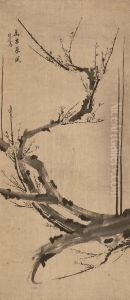Wang Dao Paintings
Wang Dao was a prominent figure in Chinese history, particularly during the Jin Dynasty, which was a period marked by significant political, social, and cultural transitions. Born in 276 in what is now Jiangsu Province, China, Wang Dao was not just a politician but also a scholar, calligrapher, and a key figure in the development of early medieval Chinese culture. His life spanned a tumultuous era in Chinese history, characterized by the upheaval following the collapse of the Western Jin dynasty and the subsequent rise of the Eastern Jin, amidst the chaos of the War of the Eight Princes and the invasion of northern China by non-Han peoples.
Wang Dao came from the illustrious Wang clan of Langya, which was renowned for its members' contributions to the cultural and political spheres of China. His uncle, Wang Dun, was a military leader and regent who played a pivotal role in the early years of the Eastern Jin Dynasty, setting the stage for Wang Dao's own political career. Despite his family's involvement in military coups and power struggles, Wang Dao is best remembered for his diplomatic and administrative skills, which helped stabilize the Eastern Jin Dynasty during its nascent stage.
Rising to prominence as a key advisor and eventually as a chief minister, Wang Dao's policies and reforms were instrumental in restoring central authority and governance amidst the fragmentation caused by internal strife and external threats. He advocated for and implemented measures to strengthen the civil administration, reduce military power in politics, and promote Confucian principles in governance. These efforts were critical in consolidating the Eastern Jin's rule and in laying the groundwork for the cultural flourishing that characterized the dynasty.
Apart from his political achievements, Wang Dao was also a significant cultural figure. He was deeply involved in the scholarly and literary activities of his time, promoting the arts and learning. His contributions to the development of calligraphy are particularly notable; he was recognized as one of the leading calligraphers of his era, and his style influenced subsequent generations. Moreover, his patronage of scholars and artists helped revive and preserve Chinese culture during a period of great dislocation and loss.
Wang Dao's legacy is multifaceted, encompassing his role in stabilizing and governing the Eastern Jin Dynasty, his contributions to Chinese calligraphy, and his efforts to foster and preserve Chinese culture during a period of significant upheaval. He passed away in 339, leaving behind a legacy that would be remembered for centuries as emblematic of the resilience and cultural achievements of the Eastern Jin Dynasty.
